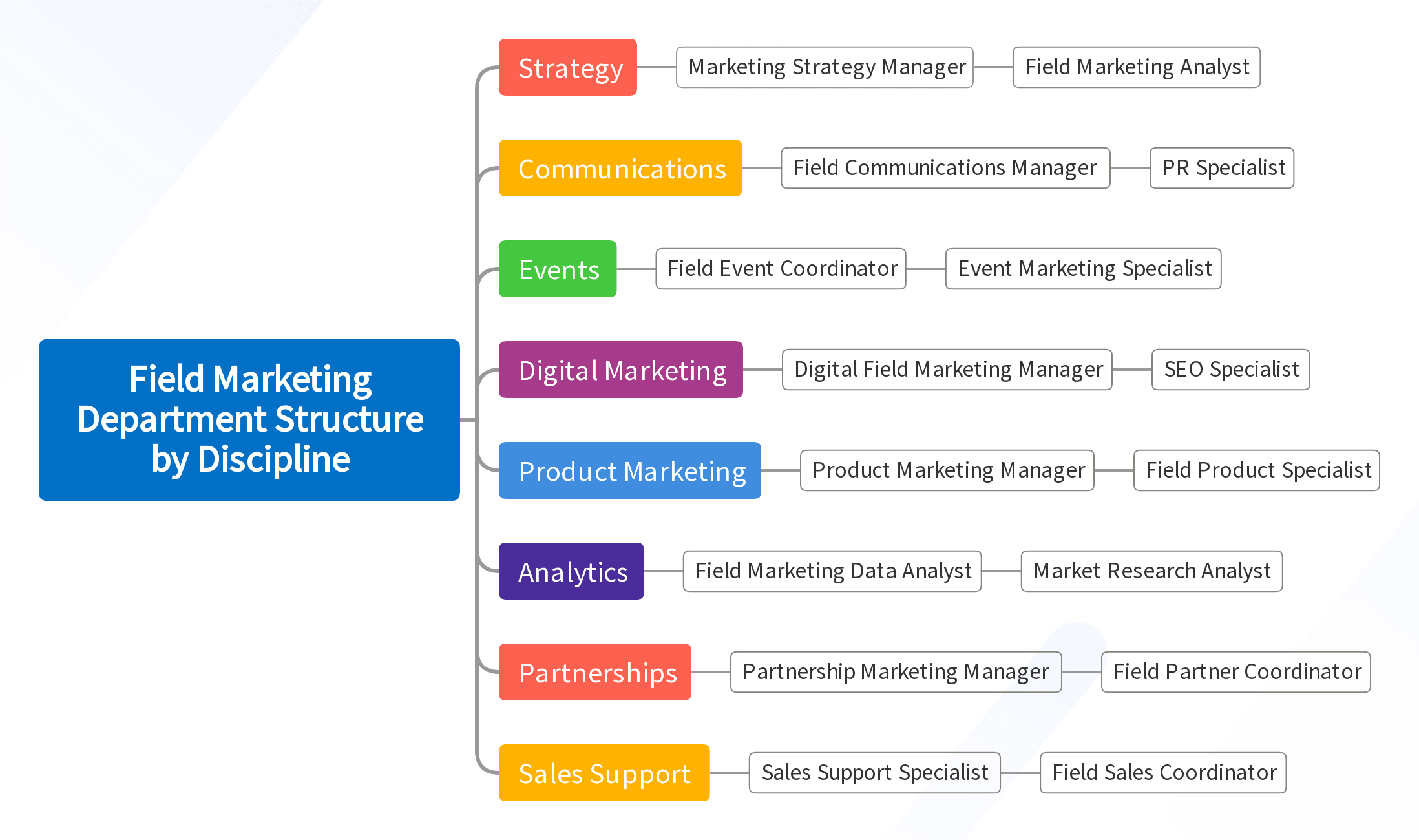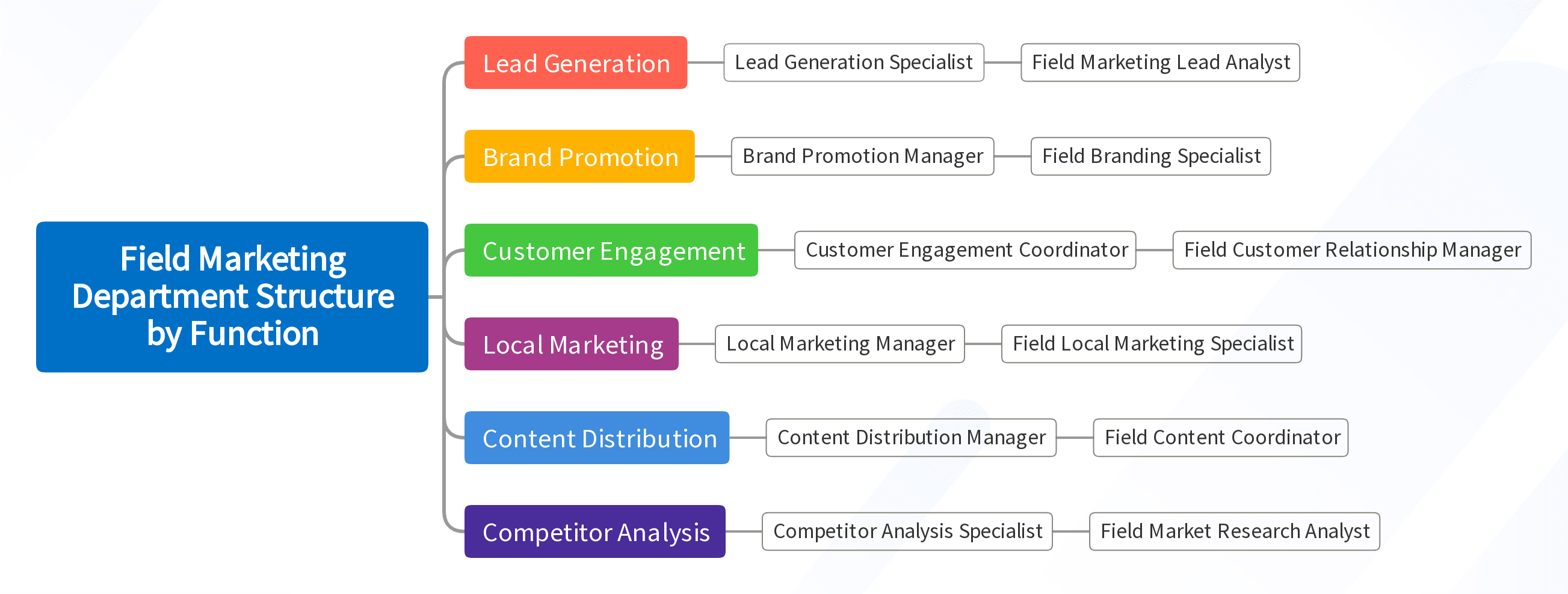

Field marketing teams play a crucial role in today's fast-paced business world. They bridge the gap between companies and their consumers.
Understanding how to structure these teams is key. A well-organized team can effectively engage customers, strengthening their connection to the brand. We've learned this firsthand while growing our own marketing agency, GrantSpark.
But first, let's talk about the Field Marketing department structures you have to choose from.
Best for Growth Marketers
Best for Paid Ads & CMO's
Table of Contents
Structuring Field Marketing Department
There are two main types of department structures based on company size and resources.
- Field Marketing department structure by discipline
- Org Type: Traditional corporate departments
- Best For: Midsize/Enterprise companies
- Field Marketing department structure by function
- Org Type: Employees are grouped by activities and objectives
- Best For: Small to Medium Sized Business (SMB)
Let’s go in-depth to each one of them.
1. Field Marketing Department Structure by Discipline


Discipline-based structure involves building teams centered around various marketing disciplines. For example, SEO, Content, Market Research, and Product Strategy could each form separate teams within a department.
| Discipline | Key Skills | Potential Roles |
|---|---|---|
| Strategy | Market Research, Brand Management, Business Analysis | Marketing Strategy Manager, Field Marketing Analyst |
| Communications | Public Relations, Content Creation, Media Relations | Field Communications Manager, PR Specialist |
| Events | Event Planning, Vendor Management, Budgeting | Field Event Coordinator, Event Marketing Specialist |
| Digital Marketing | SEO, Social Media Marketing, Email Marketing | Digital Field Marketing Manager, SEO Specialist |
| Product Marketing | Product Knowledge, Market Analysis, Customer Engagement | Product Marketing Manager, Field Product Specialist |
| Analytics | Data Analysis, Market Forecasting, ROI Tracking | Field Marketing Data Analyst, Market Research Analyst |
| Partnerships | Stakeholder Management, Negotiation, Strategic Planning | Partnership Marketing Manager, Field Partner Coordinator |
| Sales Support | Sales Strategy, Lead Generation, CRM | Sales Support Specialist, Field Sales Coordinator |
2. Field Marketing Department Structure by Function


Another approach is structuring by function, where teams are formed based on the different functions they perform. For example, promotion, launches, and relationship management could all be separate teams.
| Function | Key Skills | Potential Roles |
|---|---|---|
| Lead Generation | Prospecting, Networking, CRM Software Utilization | Lead Generation Specialist, Field Marketing Lead Analyst |
| Brand Promotion | Storytelling, Creative Campaigns, Media Planning | Brand Promotion Manager, Field Branding Specialist |
| Customer Engagement | Customer Relationship Management, Feedback Analysis, Customer Retention Strategies | Customer Engagement Coordinator, Field Customer Relationship Manager |
| Local Marketing | Regional Market Understanding, Local Advertising, Community Engagement | Local Marketing Manager, Field Local Marketing Specialist |
| Content Distribution | Content Creation, Channel Management, Content Optimization | Content Distribution Manager, Field Content Coordinator |
| Competitor Analysis | Market Research, Data Analysis, Strategic Thinking | Competitor Analysis Specialist, Field Market Research Analyst |
Field Marketing Team Size versus Business Scale
To achieve successful marketing outcomes, you need to align the team size with your business's scale – a strategic approach that helps optimize resources and drive targeted growth.
| Business Scale | Ideal Department Size | Explanation |
|---|---|---|
| Start-up | 1-3 | Limited resources, focus on core business functions. |
| Small-Medium Business | 4-10 | Growth stage requires more outreach, yet maintains lean structure. |
| Large Enterprise | 10+ | Wide scope and scale of operations necessitates larger team. |
Factors to Consider When Deciding On a Field Marketing Department Structure
- Team Skills: Look at the abilities and experience your team already has. It's crucial to have a mix of creative, tactical, and strategic skills to handle diverse marketing challenges.
- Business Objectives: Your department structure should align with your overall business goals. Whether you're focusing on customer acquisition, brand awareness, or product launches, your team's roles should reflect these aims.
- Company Size: The size of your company often determines the structure of your marketing department. Smaller businesses might require a lean team with versatile skills, while larger companies can afford more specialized roles.
- Target Market: Understand who your customers are. If your business serves different geographical regions or demographics, your field marketing team should have the expertise to engage these specific audiences effectively.
- Resources: Assess the resources at your disposal. This can include budget, technology, and time. The structure of your team should leverage these resources for maximum efficiency and impact.
Explore other marketing departments:
- Performance Marketing Team Structure
- Public Relations Team Structure
- Marketing Agency Team Structure
So, there you have it, a detailed overview of a Field Marketing team structure. From the essence of the team and key roles, to structuring and optimizing; every aspect tailored to achieve success on your business blueprint.




















